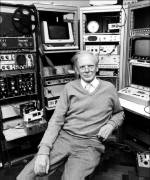

Tom Kaiser: did pioneering work in the early days of radio astronomy at Jodrell
Bank - until his communist beliefs made him unwelcome there
Professor Tom Kaiser, radar astronomer and space scientist, died on July 2 aged 74. He was born on May 2, 1924.
TOM KAISER was one of Britain's brightest and most colourful space scientists. He was greatly admired for his intellectual ability and his unwillingness to let a scientific problem beat him. In the early days of radio astronomy at Jodrell Bank, he was fascinated by the train of ionised atoms that an incoming particle of interplanetary dust leaves behind as it burns up in the atmosphere, and the way in which this train can be quantified by looking at the radar pulses that it reflects. His 1953 research article on radio echo studies of meteor ionisation was one of those classic scientific papers that ties up the loose knots of a subject so completely that few scientists felt the necessity to write on the topic again.
His work was a happy marriage between a first-class theoretical brain and a complete mastery of the practical problems of building and running experimental radar and satellite systems. On moving to the University of Sheffield, he took over a local hilltop and covered it with a variety of radar aerials. Many happy nights were spent bouncing radar pulses off meteors and the aurora borealis.
With the blossoming of the space age, his research work was directed towards rockets and satellites. Skylark rockets bearing his experiments were flown from Australia and Sweden, and these used radio propagation methods to investigate the ionosphere and aurorae. The relationships between very low frequency emissions and the production of aurorae were investigated from the British Antarctic Base at Halley Bay and using the British satellite Ariel 3.
He was famous among the industrialists of the satellite world for his work on producing a radio-clean satellite. When the satellite Ariel 3 was first tested, all the instruments interfered with each other. Kaiser had a dogged belief that this problem could be solved, and worked for weeks slowly reducing the satellite noise. For years afterwards the UK was the only nation that could produce radio "quiet" satellites. He was very much a team player and revelled in passing on ideas to others.
Thomas Reeve Kaiser was born and educated in Melbourne, Australia, and took a first in physics and radiophysics at the University of Melbourne in 1943. He then worked briefly as a research officer in the Sydney Radiophysics Laboratory of the Council for Scientific and Industrial Research, while writing an MSc thesis on radar aerials at the same time. Kaiser was an active member of the Communist Party and, in 1947, left Australia for good after hearing on the radio that he was wanted for questioning by the authorities just as his ship left harbour.
On arriving in England he went up to University College, Oxford, completing his doctorate on the acceleration of charged particles on synchrotron orbits in two years. At Oxfor he won a Blue for lacrosse and retained a lifelong love for the game, which he also served in an official capacity.
In 1950 Kaiser moved to the University of Manchester's Jodrell Bank Experimental Station as the Turner Newall and ICI Research Fellow. Unfortunately, his October 1952 telegram to President Truman demanding the release from custody of Julius and Ethel Rosenberg (who had passed US atomic bomb secrets to Soviet agents) had used the Jodrell Bank address. This not only considerably upset the Director, Sir Bernard Lovell, but also led to the discovery that one member of the small staff at Jodrell was a secret agent who had also infiltrated himhimself into the local Communist Party just to keep his tabs on Kaiser. Jodrell's reliance on funding from the United States made Kaiser's continued stay unwelcome.
After spending a year as a lecturer in physics at Reading University, he became senior lecturer at the University of Sheffield in 1956. He was appointed to the chair of space physics at Sheffield in 1966, which he held until his retirement in 1987.
Sadly, his last years were troubled by ill-health, but he was considerably heartened by the award, in 1994, of the Gold Medal of the Royal Astronomical Society.
He is survived by his devoted wife, Pamela, two sons and a daughter.